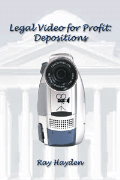
Ray's J.D. (Juris Doctor)
About ABA Accreditation:
Someone asked me the following question:Because NWCULaw is indeed a non ABA accredited correspondence law school (because the ABA will not accredit correspondence schools), and the Florida Bar specifically excludes that sort of education from being allowed to sit for the Florida Bar Exam, I fall under the Alternative method, which follows:"Is the online program ABA approved? I have a similar story to yours, I can't afford to lose my income to go to a traditional school."In short, no, the ABA does not currently accredit ANY distance learning J.D. Degree. They do allow SOME credits via distance learning. Here is the rule (from the ABA):From Standard 306: Distance Education:There are two types of online or distance learning (from the California Bar):
(d) A law school shall not grant a student more than four credit hours in any term, nor more than a total of 12 credit hours, toward the J.D. degree for courses qualifying under this Standard.A distance-learning law school is a law school that conducts instruction and provides interactive classes principally by technological means. A distance-learning law school must require at least 864 hours of preparation and study per year for four years.andA correspondence law school is a law school that conducts instruction principally by correspondence. A correspondence law school must require at least 864 hours of preparation and study per year for four years.The school that I chose is Northwestern California University School of Law. As a correspondence school, by the ABA's own rules, they cannot be accredited by the ABA.
Florida Specific Information:
I live in Florida, and Florida's rules for being allowed to sit for the Florida Bar Exam specifically state that (from the Florida Board of Bar Examiners):4-13.1 Educational Qualifications.(b) Proscribed Substitutions. Except as provided in rule 4-13.4, none of the following may be substituted for the required degree from an accredited law school:(a) Eligibility. An applicant may take the MPRE prior to graduation from law school; however, the requirements of rule 4-18.1 are applicable. To be eligible to take any portion of the General Bar Examination, an applicant must either:[Note: they are specifically referring to ABA accreditation] or within 12 months of accreditation; or,(1) complete the requirements for graduation, or receive the degree of bachelor of laws or doctor of jurisprudence, from an accredited law school
(2) be found educationally qualified under the alternative method of educational qualification provided in rule 4-13.4.(1) private study, correspondence school, or law office training; [NOTE: NWCULaw is a "correspondence" school, and this Florida specific rule appears to be taking aim directly at the California alternative avenues to a law career.]
(2) age or experience; or,
(3) waived or lowered standards of legal training for particular persons or groups.
4-13.4 Alternative Method of Educational Qualification.So, for me, in Florida, I have to obtain the California Bar passage, then practice in California (or some other state) for ten years before applying to the Florida Bar.(a) Applicants Not Meeting Educational Qualifications. An applicant who does not meet the educational qualifications in rule 4-13.1, must meet the following requirements:[This seems excessive... ten years?] in the District of Columbia, in other states of the United States of America, or in federal courts of the United States or its territories, possessions, or protectorates, and was in good standing at the bar of the jurisdictions in which the applicant practiced; and(1) evidence as the board may require that the applicant was engaged in the practice of law for at least 10 years
[Note, the next paragraph of the rule was long; it just says that along with practicing in another jurisdiction, you have to show the work you have been doing for that ten year period of time.]
While Florida specifically excludes correspondence education, I will attempt to appeal for an exemption or waiver once I complete the California process. I will seek to acquire some work from California once I pass the California Bar Exam. This will not be an easy task, but it is my endeavor to 1) go this route and 2) attempt to appeal to Florida to gain acceptance of my efforts.
If I fail, at least I failed trying, and who knows, someone may open the door for me before I get there myself, or I might be able to open the door for others who follow.


